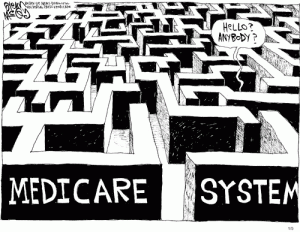Could a comprehensively integrated approach to all healthcare needs – acute and chronic – affecting the elderly offer financial opportunity for senior housing?
Readers of these blogs are experts in aging. Take a close look at the graph above; it demonstrates that America’s healthcare challenge is most evident at the ages for which senior housing has the expertise. Could a comprehensively integrated approach to all healthcare needs – acute and chronic – affecting the elderly offer financial opportunity for senior housing? If so, would that also benefit our nation?
We’ve all heard the story of how America’s healthcare costs are much higher than those of any other comparable nation. In the following chart, showing per capita 2017 annual healthcare expenditure in dollars, the United States is at the far right and India is at the left. The data is from the Organization for Economic Cooperation and Development (OECD). Note that it’s in the government/compulsory category that American costs are most out of proportion to costs in other nations.
We can’t be economically competitive in global markets if our healthcare costs continue to be that far out of line. What the data at the head of the column show is that the senior housing industry can be the mechanism to help bring costs back into line. The ages most promising for reducing cost while improving quality of life are the very ages in which senior housing is most expert.
Senior Housing Expertise
Look again at how healthcare costs soar beginning with age 65. If senior housing were to reinvent healthcare delivery at those ages, it might be possible to bring American costs in line with those in Europe and to glean additional financial benefits for the industry as well. A promising alternative is to partner with established medical provider entities, such as Kaiser Permanente, to work together to benefit the elderly, the nation, and providers. A hybrid approach – partnership combined with reinvention – is what seems most likely for those providers bold enough to seize the opportunity.
Recently, the Wall Street Journal published an essay by Katy Butler, Preparing for a Good End of Life, detailing the excessive medical interventions that have become customary for America’s elderly. Senior housing conceptually is able to palliate conditions and to retain dignity far better than is possible within the clinical world of today’s medicine. If you’re having trouble grasping all this, read the article, and it will be much clearer.
Yes, there are laws that mandate, for instance, senior housing transport people to and from hospitals as they decline toward life’s end. Still, a new national vision could repeal such dehumanization. Senior housing is central to the solution. Yet, the medical model dominates, and the cost of care is astronomical.
That’s the current context. The opportunity lies in lowering those soaring costs at advanced ages and, at the same time, improving the lives of the elderly. To monetize that opportunity requires that those entities that craft that improvement be proportionately rewarded.
What It Would Take
Unlocking the senior housing opportunity requires governmental, political, and cultural support for several conditions.
-
It requires substantial expertise that most senior housing operators do not now have.
-
It requires senior housing/services operators to qualify Medicare Advantage plans for their residents/participants.
-
It requires a very high standard of business judgment and analytical acuity.
-
It requires a sensitivity to the partisan, special-interest political and lobbying context in which American healthcare policy is determined.
-
It requires fair government-established Medicare Advantage rates that don’t favor the government default option over citizen choice.
-
It requires the relentless pursuit of effective customer value vs. process and collegiality.
-
It requires rethinking our medical model with fewer medical visits, more continuous customer interaction (as in senior housing), efficient lab processing, negotiated Rx pricing, and most importantly, an emphasis on reduction of suffering and improvement of life quality over life prolongation.
Compassion First
The last condition is central to the rest, and senior housing operators are uniquely expert in being able to imagine and put such a model into place. Operators and their staffs understand that compassionate palliation is often more important than intervention and that quality of life is more important than length of life. The risk is that the medical providers – Kaiser, Mayo, etc. – may absorb the senior housing industry instead of the other way around.
Recent Developments.
Although this article was initially written before the NIC Conference, it has taken on new relevance in light of the intensive discussion at NIC about Medicare Advantage plan approaches. This deserves some brief comment.
First, providers need to put the wishes and best interests of those they serve first. There is a grave political danger that some may argue that we are accelerating end-of-life in order to save money. That is an obversely negative point of view. The truth is that compassionate care, which retains human dignity and resists medical objectification of the very old, is the opposite of mercenary. It is mercenary when some practitioners use the elderly as guinea pigs for experimental treatments or to train neophytes. Our industry – the senior housing industry – is better than that and by putting human value before money value we can improve the lives of those we serve, create a better quality of life, and reduce needless enrichment.
Second, there are many medical models that fall under the Medicare Advantage opportunity. Plans vary widely in the degree of innovation and in the balance between patient welfare and enterprise aggrandizement. What can work to elevate human values is a model in which those who interact on a daily basis with the very old can have ready access, 24/7, to the physician experts. Those physicians need to have the geriatric expertise and professional judgment to spare the elderly, and very old, needless transports and unnecessary tests and procedures. This requires reversing some of the hierarchical concepts of medical privilege that still exist. Senior housing is uniquely well-positioned to help foster this reversal to put the patient at the top of the pyramid.
In short, many Americans have opinions about the future of healthcare. Few have data. And fewer still have the opportunity that beckons to those in senior housing.








